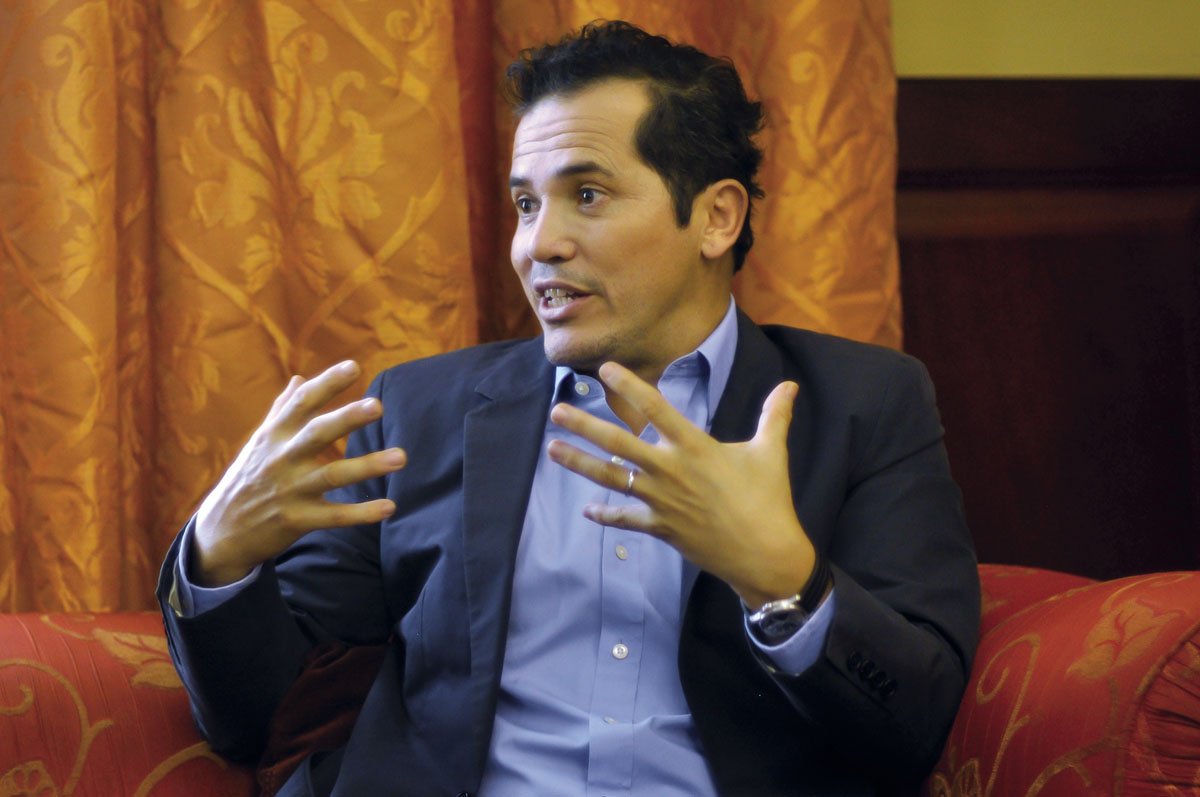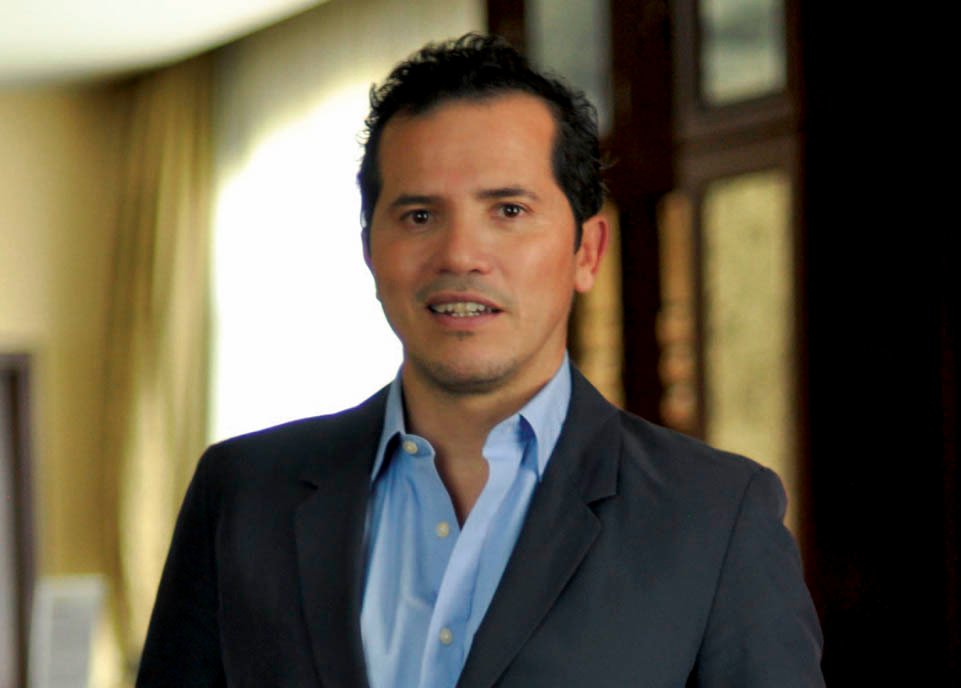
Leguizamo: “Hollywood is a Cruel Apartheid State”
By: Iván Beltrán Castillo y Luz Martínez
Photos: Felipe Rodríguez
I look at my past as a big production: the early days, my first loves on the theater circuit, my first experiences on film sets, friendly faces, and the furrowed brows of my detractors… It all seems like a big screenplay.
I’ve always acted. At first, while I was still at school, I did it unconsciously, without realizing what I was doing, and then on purpose; it became a goal, a shining, mysterious port that called to me. I started with mockery and sarcasm, imitations, gags, parodies, and staged jokes. The butts of those “innocent jokes” were generally my teachers and classmates. Sort of the larval stage of my art. An endless, boring, adolescent nightmare. Then one of my sharper, more sensitive teachers, probably sick of putting up with me, encouraged me to use all that energy to become an actor. Until then, I was just the class clown, the kind of cocky, annoying Jerry Lewis you find in every schoolyard. But when I began to channel all the energy behind that, it took on a different color and everything changed.
I was born in Colombia, in Bogota’s classic Chapinero neighborhood, but I moved to the US with my parents when I was just four years old. I see it now as the typical attempt to make it big that so many Latin Americans made. Along with many others, Alberto Leguizamo and his wife Luz chased the elusive “American Dream,” jumping on the never-ending caravan of immigrants hoping to transcend their geographic borders and meager economic situations in the belly of western civilization.
It was like we fell out of the distant, sunny, tropical South American skies. I now realize we were all a bunch of South American dreamers, pounding the rough, hardened, completely prosaic streets of New York, where majestic architecture and monstrous technology meld with the most incredible, occasionally sordid, and often turbulent stories, and where the compulsive beat of the modern world feeds on the most ironic, paradoxical, spastic, and dramatic of apotheoses.
I soon realized that if I wanted to survive in the Big Apple I’d have to hang out with Latinos. I sensed it. There was a lot of racism back then and there still is. The most extreme cases, the thinly disguised heirs of the Ku Klux Klan, couldn’t stand to see us on the streets. I remember the confrontations, the insults, and ruthless beatings they doled out that could have cost us our lives, and did take the lives of many. Every morning I left home with a kind of dizzy awareness of danger in my gut. I wondered why so many people found our presence so offensive, like some huge scandal. Those are the bitter memories —the sharp and stinging bigotry— that later fed my plays and stand up comedy: the witchcraft of art, the only instrument that can transform bitter into sweet.
Two gifts helped me through those initial years: the company of other Latinos and my discovery of the dramatic arts. And both came while I was still quite young, before the bitterness had a chance to permanently take root inside of me.

Art at the Root of It All
While I was still unknown, I could play at being someone else on the street, in the subway, in restaurants. Play is at the root of all art, its magical purpose and wonderful duty. I loved to change identities, feed my wild fantasies, stretch myself and look for other selves inside me, imitate people who seemed attractive or tragic or flashy.
I finished high school with very mediocre grades and right after graduation I began studying at Long Island University where I discovered acting as a way of life. I became another castaway on the “Island of Daydreamers,” the term used by some to refer to filmmakers’ “victims” —the men and women who find comfort in their boring, trivial lives by sitting in darkened theaters, feeding on the lives, adventures, heroic stories, and passions of fictional beings who nevertheless seem to know more about life than we do. I watched Richard Pryor, Robert De Niro, and Al Pacino revealing the subtlest creases in the human soul, laying their hearts on the line with every movement, the raise of an eyebrow, witty, raw language, and the cutting silences an audience never forgets. I was devoted to them and they became my mentors, models, and the compass that guided me.
I wasn’t guided only by the essential falsehood that was film; I gave myself up to the no less enchanting and complex fiction of the theater. When a play really got to me, I would see it five or six times until I could recite the lines more faithfully than the actors themselves. I saw Pacino dozens of times and always from the front row. That guy used to get so into his work that by the climax of the play he’d literally spit out his lines and those of us sitting close enough were the happy victims of his vocal frenzy as his saliva rained down on us. He spit on me on countless occasions. It was like a strange kind of baptism that made me very proud. I think I’m still proud of it.
I did everything at first: waiter, messenger, courier, dishwasher…It was a very fertile time and I dug deep into the secrets of the human zoo that is New York City, with all its amazing nuances.
I don’t want to sound hyperbolic or mushy or pathetic, but I am certain that writing saved my life, like it saves almost everyone who goes there looking for explanations and relief. It saved me not just once, but many times. From the first time I picked up pen and paper and tried to plant my visions and dreams in a kind of field inside me. Those visions and dreams returned to me covered in beauty.
At the same New York City school where I annoyed students and teachers alike, and where I won the “Biggest Talker and Bullshitter of All Time” award, I started writing sketches, skits, and monologues, and put myself into all of them. Your first roles are as unforgettable as your first loves and they can ruin you for life. That’s exactly what happened to me.
Off to Conquer Mecca
After discovering the erotic appeal of applause, establishing an almost sacred communication with an army of invisible friends watching from the darkness, experiencing the ritual communion of theater, I could never conceive of doing anything else. I started in theater, made a brief foray into television, and finally ventured into the world of film, in its most legendary and magnificent incarnation: the mythological Hollywood that has fed the world’s fantasies and filled it with beloved ghosts, with rules nowhere near as kind as those of musicals or comedies, where happy endings are rare, except for a handful of the chosen ones.
I see Hollywood as the South Africa of show business, with a kind of apartheid invented by greedy producers and shallow stars. Latinos live in one part of town and the rich whites in another. Sometimes you feel like you’re in Gone with the Wind. Nowhere else in the United States is segregation, arrogance, and selfishness so apparent. Never, not even in violent New York City, or frivolous Miami, or good old Las Vegas, have so many vile acts been committed against people looking for opportunities.
Art, to me, is the sublime sleeping inside every human being. Thanks to art you can observe the human spectacle indulgently, with more desire to understand than to judge, from the perspective of an erudite onlooker or tuned-in sage rather than circumspect judge.
I’ve worked on a lot of films but the ones I remember best, perhaps because of the subtle and amazing way they changed my life, were The Take (2007), Where God Left his Shoes (2007), Moulin Rouge! (2001), Romeo + Julieta (1996), and Carlito’s Way (1993), where I had the good fortune to kill Al Pacino while playing Benny Blanco from the Bronx.
I always remember the beatings we took from the white boys when I was a kid and they give me the strength to keep writing about Latino life in the great kingdom of power and glory. We’re the other color, the other sensibility, the other vision, in a world where being different is sometimes considered a crime. That’s why I always want to play a Latino in my films, but a dignified Latino, a professional Latino, an intelligent, sensitive Latino…
Others care about success. I care about a hug…
